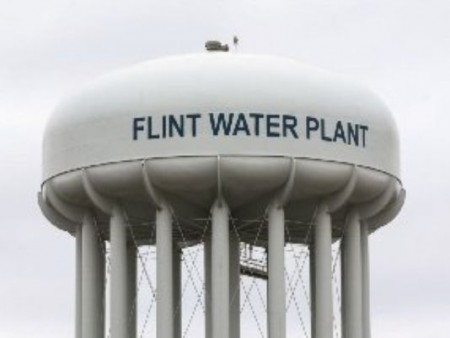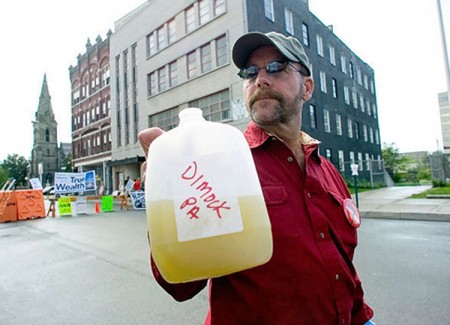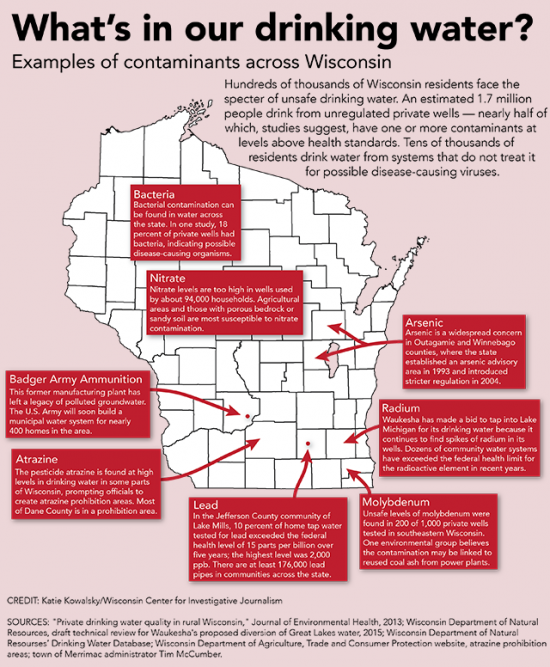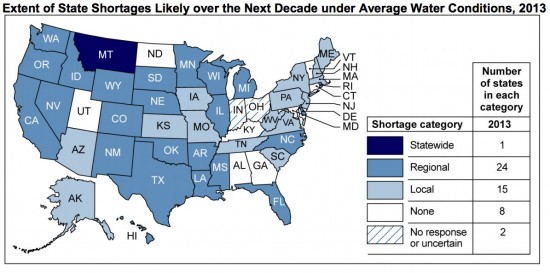April 5, 2016 – The water crisis in Flint, Michigan is a symptom of a much wider problem – a lack of freshwater in many parts of the United States and in other countries, both in the Developed and Developing World.
Flint, Michigan
The Flint problem was twofold, a tainted river source containing high levels of lead and other toxins, and a government trying to save a buck. When you consider that Flint has access to the water of Lake Huron, the third largest body of freshwater on Earth, and part of the Great Lakes, it is hard to understand how a city could ever have gotten to a state where it was poisoning its citizens every time they turned on their kitchen taps.
The population of Flint was a victim of its political leadership even though the city sat right next to clean freshwater wealth. The result, a population-wide exposure to lead that will resonate through the community for a generation and beyond.
And maybe it all didn’t matter in the political scheme of things because Flint was a marginalized community, a rust belt city where 40% live below the poverty line, and 33% of the population is illiterate. On top of that most of the population was largely not the skin color of those in the government offices responsible for ensuring freshwater safety.
Flint’s experience is far from unique.
Dimock, Pennsylvania
In Pennsylvania the federal government denied that hydraulic fracturing was contributing to well water contamination near oil and gas company drilling sites. The Environmental Protection Administration (EPA) issued a report in mid-2015 stating no evidence exists that fracking was causing drinking water contamination. A backlash from 31 scientific contributors to the report, describing it as a whitewash, soon followed. The 31 called the report’s conclusions misleading because of words like “no evidence fracking has led to widespread, systemic impacts on drinking water resources.” Note the words “widespread” and “systemic,” weasel-words to give the EPA an out. It turns out in the last month a federal civil suit against Pennsylvania’s largest fracking company, Cabot Oil and Gas, has led to a judgment awarding two Pennsylvania families, $4.24 million where in fact their well water was indeed contaminated by fracking operators. This may be the tip of the spear leading to numerous law suits against the fracking industry and should lead to a tighter regulatory environment.
Waukesha, Wisconsin
I have previously written about Waukesha, Wisconsin and its freshwater problems. That was back in October 2013. Waukesha lies just to the west of Milwaukee and draws its water from an underground aquifer highly contaminated by naturally occurring radium. Only a small part of the city lies within the Lake Michigan watershed. The rest is part of the Mississippi-Missouri river basin. But because a portion of the city straddles the dividing line between the two watersheds it has repeatedly requested it be allowed to take water from Lake Michigan to solve its radium crisis.
Waukesha isn’t alone in Wisconsin in having contaminating drinking water. Take a look at the map below to see just how many parts of the state are currently impacted by freshwater challenges. That’s part of the problem.
The Great Lakes come under an international water agreement between Canada and the United States that specifically bans diverting water from the system with few exceptions. So as close as Waukesha may be to Lake Michigan the vast majority of it lies outside the watershed. Ontario, within its rights, as a signatory to that international agreement, has expressed concern about the proposed diversion. Creating a precedent could lead to many other diversion exceptions as seen on the Wisconsin map. It could even lead to requests to send Great Lakes water by pipeline through the Mississippi-Missouri river system further west to join up with the Colorado River basin and feed the freshwater requirements of the parched American Southwest.
These are just three examples of freshwater crises in America today. We haven’t talked about the coastal freshwater aquifers of the eastern United States becoming contaminated by intrusive saltwater from rising sea levels. Nor have we discussed California, Nevada and Arizona’s freshwater challenges brought on by prolonged drought that may be the beginning of a climate change inducing megadrought lasting centuries.
In fact, a recent survey by the Government Accountability Office of the United States, has water managers in 40 of the 50 American states reporting current and expected freshwater shortages in at least some parts of their states through the next decade. See the extent of the problem in the map below.
A Global Problem
Freshwater scarcity is far from unique to the United States. China is diverting water from the Yangtze to the Hwang He River to meet the freshwater demands of its northern cities. This is water engineering on a colossal scale and is producing all kinds of unintended consequences, the kind that the signatories of the Great Lakes-St. Lawrence water convention fear could happen.
And yet America’s freshwater crisis is not the worst in the world. Freshwater is a global challenge. Today 20% of the world’s population lives in a state of freshwater scarcity. Another 25% have limited access to freshwater largely because of a lack of infrastructure. And by 2030 the United Nations estimates 50% of the world’s population will be living with freshwater scarcity. It is fair to say that freshwater has become in the 21st century what oil was in the 20th. It is in high demand but limited in supply with climate change only going to make things worse. Yet fossil fuel companies, who produce the carbon generating pollutants leading to global-warming climate change, continue to frack with impunity and apply to national governments globally for additional lease rights to do further exploratory drilling both on and offshore. All of this while governments around the world have agreed on a plan to wean humanity off fossil fuels because of the very climate change that is contributing to global freshwater shortages. How nuts is this?
























